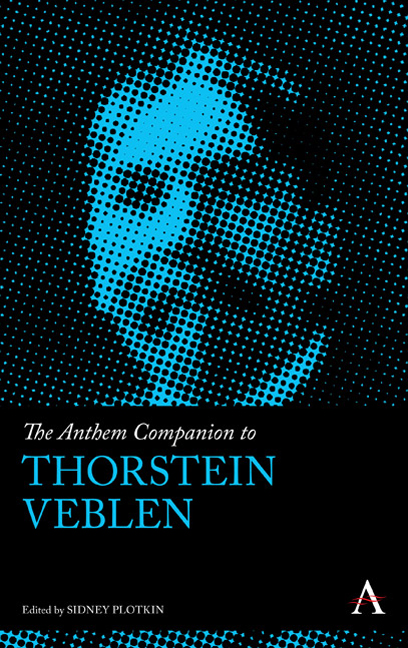Book contents
- Frontmatter
- Dedication
- Contents
- Acknowledgments
- Introduction: Thorstein Veblen's Elusive Project
- Part I METHOD, PHILOSOPHY AND VALUES
- Contents
- Part II CAPITALISM, SOCIAL STRUCTURE AND POLITICS
- Chapter Six Reigniting the Anthropology of Capitalism: Returning to Veblen, after Postmodernism, after Postcoloniality
- Chapter Seven On the Social Origin of the Leisure Class in Turkey: For a Veblenian Turn in the Marxian Research Program of Turkish Studies
- Chapter Eight Veblen's Localism and Its Ambiguities
- Chapter Nine Learning from Veblen's Masterless Man for Grassroots Democratic Change
- List of Contributors
- Index
Chapter Seven - On the Social Origin of the Leisure Class in Turkey: For a Veblenian Turn in the Marxian Research Program of Turkish Studies
from Part II - CAPITALISM, SOCIAL STRUCTURE AND POLITICS
Published online by Cambridge University Press: 10 January 2018
- Frontmatter
- Dedication
- Contents
- Acknowledgments
- Introduction: Thorstein Veblen's Elusive Project
- Part I METHOD, PHILOSOPHY AND VALUES
- Contents
- Part II CAPITALISM, SOCIAL STRUCTURE AND POLITICS
- Chapter Six Reigniting the Anthropology of Capitalism: Returning to Veblen, after Postmodernism, after Postcoloniality
- Chapter Seven On the Social Origin of the Leisure Class in Turkey: For a Veblenian Turn in the Marxian Research Program of Turkish Studies
- Chapter Eight Veblen's Localism and Its Ambiguities
- Chapter Nine Learning from Veblen's Masterless Man for Grassroots Democratic Change
- List of Contributors
- Index
Summary
At the dawn of modern Western political theory, Niccolò Machiavelli proposed that in human history two modes of principalities or, in words more attuned to the present, types of government that memory could track had come into view. In the first mode a prince governed the kingdom with the assistance of his ministers, who were also his servants. In the second mode a prince ruled just by gaining the support of some magnates or, as Machiavelli called them, “barons” who held “that rank not by favor of the lord but by antiquity of bloodline.” On the basis of these empirically verifiable propositions, Machiavelli made inferences to state and social structures from these purportedly distinct polities. As one of his recent biographers observes, these conjectures were “the result of a compulsion to set down on paper ideas and attitudes that had long been brewing in his mind and that […] he could no longer suppress.”
In the terms of Machiavelli, barons had “their own states and subjects” who acknowledged them as lords and held them “in natural affection.” In the other mode, in contrast, there was only one lord, and all the others were his “slaves.” The slaves or servants did not recognize anybody as superior other than the lord himself. Had they complied with the command of someone else, they would have done so “as a minister and official.” Yet they did not “bear him any particular love.” “In our times the examples of these diverse kinds of government,” asserted the Renaissance Florentine philosopher, “are the Turk and the king of France.” In this sense, as Machiavelli observed it, in the kingdom of the Turk, individuals comprising the officialdom were of an unusual kind in that they could not develop an attitude of “natural affection” to one another. Not only were the subordinate officials not particularly fond of their superiors but also the Grand Turk did not have to care much about the people of his principality or, to use a Veblenian term, the “underlying population” of the land.
- Type
- Chapter
- Information
- The Anthem Companion to Thorstein Veblen , pp. 189 - 212Publisher: Anthem PressPrint publication year: 2017



